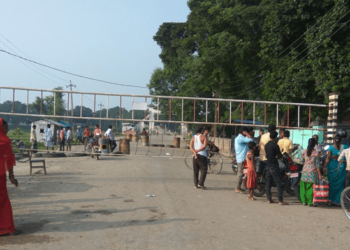KATHMANDU: How many of you have received the exact medicine prescribed by your doctor at the drugstore?
For many patients, the reality is that drugstores often offer alternatives, claiming they do the same job.
Unfortunately, this trend has been harming the availability of Cetamol, a government-produced medicine, for years.
Doctors prescribe Cetamol to patients with fever, but when they reach the pharmacy, they are handed a different brand.
Cetamol is a well-known medication produced by Nepal Aushadi Limited (NAL), which operates under the Ministry of Industry of the Government of Nepal.
The company is legally authorized to manufacture Cetamol. However, when consumers attempt to purchase it at drugstores with a doctor’s prescription, they are often turned away, forced to accept products from private or Indian companies.
This isn’t due to a lack of production capacity, but rather because of the influence of commission-based incentives, which leave consumers deprived of access to quality, locally produced medicine.
Bhakta Khadka, 65, a resident of Kapan who recently returned from Kavre, complains about the unavailability of the Cetamol he once relied on.
He says, “The Cetamol we used to take was effective—it would relieve fever and headaches instantly. But the Cetamol available today does nothing.”
Khadka notes that even health posts, where Cetamol was once available, no longer stock it.
General Manager Kailash Paneru acknowledges that many others, like Khadka, are seeking the government-produced Cetamol.
Paneru shared with Khabarhub that he has personally heard similar complaints while conducting health camps in rural areas like Dadeldhura.
Dipesh Dahal, a pharmacist at Annapurna Neuro Hospital, notes, “Not just Cetamol from Nepal Aushadi Limited, but other locally produced paracetamol brands like Niko have also faced complaints from patients about ineffectiveness.”
Paneru explains that while the company sells medicines worth Rs 50 million annually, only 30 million Cetamol tablets are produced.
However, the demand for this product is low in urban areas, with most sales occurring at district hospitals and rural health posts.
Commission Dilemma: Cetamol’s reputation under attack
The procurement process at many hospitals and pharmacies is often based on tenders. In these cases, price is prioritized over quality, leading to the purchase of cheaper alternatives.
As a result, the Cetamol produced by Nepal Aushadi Limited is being pushed out of the market.
Raghubir Yadav, a pharmacist at District Hospital Salyan, confirms this issue. He explains, “All medicines we receive come through tenders, and some are sent by the provincial health directorate. The directorate sends us Cetamol from Nepal Pharmaceuticals, but we don’t know where the rest of the medicines come from.”
Yadav also points out that while Salyan once faced a shortage of Cetamol, the situation has improved, and there are now enough supplies to meet demand, with consumers taking the medicine without complaints.
No compromise on quality
As a government-owned company, Nepal Aushadi Limited prides itself on the quality of its products.
General Manager Paneru asserts, “We are a government company. We have our own lab and a dedicated drug management department. All our medicines undergo thorough quality checks. Our transparency and accountability are paramount, and consumers can trust the quality of our products.”
While Nepal Aushadi Limited has expressed concerns that the government is not purchasing its Cetamol, Narayan Dhakal, the Director General of the Department of Drug Management, insists that the company must learn to compete in the open market.
Paneru is confident that if consumers were given a choice between Cetamol from the government and from private companies, they would prefer the government-produced version.
However, some pharmacists report that patients continue to request alternatives, claiming that Cetamol does not work as effectively.
Dipesh Dahal, a pharmacist at Annapurna Neuro Hospital, notes, “Not just Cetamol from Nepal Aushadi Limited, but other locally produced paracetamol brands like Niko have also faced complaints from patients about ineffectiveness.”
Dahal mentions that many patients now prefer an Indian brand called Medomol, further illustrating the growing skepticism toward domestic products.
Cetamol’s empire at Bir Hospital
Despite concerns about the quality of government-supplied Cetamol, there is still strong demand for it in some institutions.
For instance, at Bir Hospital, one of Nepal’s oldest and most prominent health providers, Cetamol remains a popular choice.
Pharmacy in-charge Man Bahadur Mahara reports that while Cetamol from four different companies is available at the hospital, many patients specifically ask for the government-produced Cetamol.
Mahara shares that Bir Hospital used to receive 50,000 tablets of Cetamol monthly via government-to-government (G2G) agreements, though this was not enough to meet demand.
After production resumed in 2074 BS, the hospital began sourcing Cetamol directly from Nepal Aushadi Limited, which has alleviated the shortage.
Without an increase in production capacity, the company cannot meet the nation’s full demand, even if the government were to rely solely on their supply.
Mahara also emphasizes that there has been no shortage of Cetamol at Bir Hospital since then, and many other products from Nepal Pharmaceuticals are regularly stocked.
Another govt agency responds: “No alternative but to compete”
While Nepal Aushadi Limited has expressed concerns that the government is not purchasing its Cetamol, Narayan Dhakal, the Director General of the Department of Drug Management, insists that the company must learn to compete in the open market.
Dhakal questions, “If even with a near-monopoly on Cetamol, the company is still unable to meet demand, how will Nepal Aushadi Limited compete in a competitive market?”
In a conversation with Khabarhub, he further stated, “While Nepal Aushadi Limited has a near-monopoly on Cetamol, if the product is not selling, isn’t it because people simply don’t want it? We can’t force consumers to buy it.”
He emphasized that the government has never mandated a stop to the import of foreign medicines or insisted that only Nepal Aushadi Limited’s Cetamol be sold. For Nepal Aushadi Limited to succeed, Dhakal says, the company must take its own initiative.
Responding to claims from some pharmacies that Nepal Aushadi Limited’s Cetamol is of poor quality, Dhakal told Khabarhub, “As a government company, the quality of our medicine is good. However, some products may degrade in quality due to factors like improper storage.”
He added, “Our Department is actively working to identify and remove such products from circulation, while enhancing monitoring and enforcing better storage and handling practices.”
While the government has expressed a willingness to support Nepal Aushadi Limited’s medicines, Dhakal acknowledges that the company must improve its capacity.
“You can’t sidestep the procedures in government operations. There are procurement bodies, and they have specific needs that must be met,” he stated.
According to Dhakal, Nepal’s total requirement for Cetamol is 170 million tablets annually.
However, Nepal Aushadi Limited’s current capacity is limited to producing medicines worth just 50 million annually.
Without an increase in production capacity, the company cannot meet the nation’s full demand, even if the government were to rely solely on their supply.









Comment